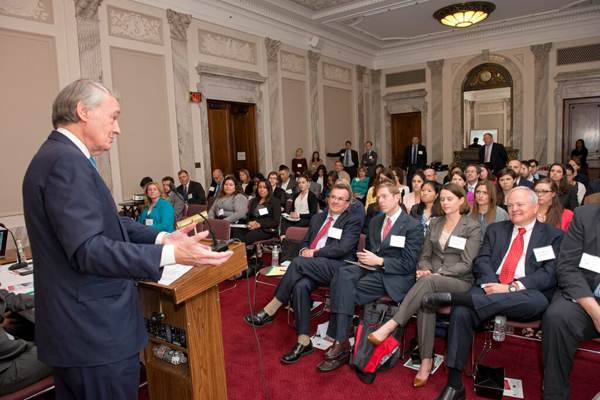Northeastern hosts DC briefing on urban coastal sustainability

Northeastern University last week hosted a briefing for lawmakers in Washington in which a panel of experts discussed the impact extreme weather and unprecedented global change is having on coastal ecosystems and the steps being taken to protect and strengthen those marine networks.
Northeastern is leading cutting-edge research and programs in marine science and urban coastal sustainability, particularly through the Marine Science Center in Nahant, Massachusetts. The university held the briefing on Capitol Hill in partnership with U.S. Sen. Edward Markey of Massachusetts.
“We are fortunate to have Northeastern as a resource working on significant global environmental and conservation issues—issues like coastal resilience, marine science, fisheries protection, and climate change,” Markey said at the briefing.
The panel comprised Geoff Trussell, director of the Marine Science Center and chair of the Department of Marine and Environmental Sciences at Northeastern; Holly Bamford, acting assistant secretary for conservation and management at the National Oceanic and Atmospheric Administration (NOAA); and Michael Conathan, director of ocean policy at the Center for American Progress.
The briefing attracted a packed audience, including key congressional staff focused on federal programs related to the environment and sustainability as well as federal agency staff and research associations. They asked several questions of the panel on topics ranging from the science to the politics of climate change.
J. Murray Gibson, founding dean of Northeastern’s College of Science, moderated the briefing. In his remarks, Gibson noted Northeastern’s continued efforts to examine and mitigate the threats posed by global climate change, such as coastal pollution, sea-level rise, and extreme weather.
A key part of this endeavor is enabling coordinated efforts in response to current and future threats by improving state and local government decision-makers’ knowledge about sustainability. One example of this effort is the Urban Coastal Sustainability Initiative, which promotes interdisciplinary collaboration among life scientists and social scientists to sustain coastal cities, as well as deepened learning and research experiences for students.
The initiative is just one aspect of the work underway at the Marine Science Center, which juts into the ocean about five miles from the entrance of Boston Harbor. It is an internationally recognized center of marine science research and education, and also is home to the Ocean Genome Legacy, which is dedicated to exploring and preserving the threatened biological diversity of the sea.
The briefing dovetailed with Northeastern’s focus on sustainability, which is one of the university’s three strategic pillars of research along with health and security.




